When the World Shook (19)
By:
July 13, 2012
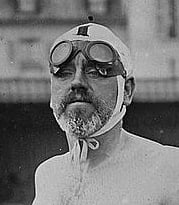
HILOBROW is pleased to present the nineteenth installment of our serialization of H. Rider Haggard’s When the World Shook. New installments will appear each Friday for 24 weeks.
Marooned on a South Sea island, Humphrey Arbuthnot and his friends awaken the last two members of an advanced race, who have spent 250,000 years in a state of suspended animation. Using astral projection, Lord Oro visits London and the battlefields of the Western Front; horrified by the degraded state of modern civilization, he activates chthonic technology capable of obliterating it. Will Oro’s beautiful daughter, Yva, who has fallen in love with Humphrey, stop him in time?
“If this is pulp fiction it’s high pulp: a Wagnerian opera of an adventure tale, a B-movie humanist apocalypse and chivalric romance,” says Lydia Millet in a blurb written for HiLoBooks. “When the World Shook has it all — English gentlemen of leisure, a devastating shipwreck, a volcanic tropical island inhabited by cannibals, an ancient princess risen from the grave, and if that weren’t enough a friendly, ongoing debate between a godless materialist and a devout Christian. H. Rider Haggard’s rich universe is both profoundly camp and deeply idealistic.”
Haggard’s only science fiction novel was first published in 1919. In September 2012, HiLoBooks will publish a beautiful new edition of When the World Shook, with an introduction by Atlantic Monthly contributing editor James Parker. NOW AVAILABLE FOR PRE-ORDERING!
SUBSCRIBE to HILOBROW’s serialized fiction via RSS.
LAST WEEK: “We went on and came to a flat country that was lined with ditches, all of them full of men, Germans on one side, English and French upon the other. A terrible bombardment shook the earth, the shells raining upon the ditches. Presently that from the English guns ceased and out of the trenches in front of them thousands of men were vomited, who ran forward through a hail of fire in which scores and hundreds fell, across an open piece of ground that was pitted with shell craters.”
ALL EXCERPTS: 1 | 2 | 3 | 4 | 5 | 6 | 7 | 8 | 9 | 10 | 11 | 12 | 13 | 14 | 15 | 16 | 17 | 18 | 19 | 20 | 21 | 22 | 23 | 24
On another night we visited the East. China with its teeming millions interested him extremely, partly because he declared these to be the descendants of one of the barbarian nations of his own day. He made a remark to the effect that this race had always possessed points and capacities, and that he thought that with proper government and instruction their Chinese offspring would be of use in a regenerated world.
For the Japanese and all that they had done in two short generations, he went so far as to express real admiration, a very rare thing with Oro, who was by nature critical. I could see that mentally he put a white mark against their name.
India, too, really moved him. He admired the ancient buildings at Delhi and Agra, especially the Taj Mahal. This, he declared, was reminiscent of some of the palaces that stood at Pani, the capital city of the Sons of Wisdom, before it was destroyed by the Barbarians.
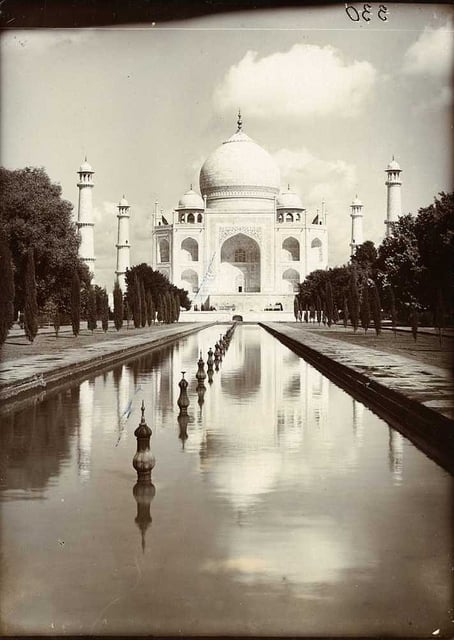
The English administration of the country also attracted a word of praise from him, I think because of its rather autocratic character. Indeed he went so far as to declare that, with certain modifications, it should be continued in the future, and even to intimate that he would bear the matter in mind. Democratic forms of government had no charms for Oro.
Amongst other places, we stopped at Benares and watched the funeral rites in progress upon the banks of the holy Ganges. The bearers of the dead brought the body of a woman wrapped in a red shroud that glittered with tinsel ornaments. Coming forward at a run and chanting as they ran, they placed it upon the stones for a little while, then lifted it up again and carried it down the steps to the edge of the river. Here they took water and poured it over the corpse, thus performing the rite of the baptism of death. This done, they placed its feet in the water and left it looking very small and lonely. Presently appeared a tall, white-draped woman who took her stand by the body and wailed. It was the dead one’s mother. Again the bearers approached and laid the corpse upon the flaming pyre.
“These rites are ancient,” said Oro. “When I ruled as King of the World they were practised in this very place. It is pleasant to me to find something that has survived the changefulness of Time. Let it continue till the end.”
Here I will cease. These experiences that I have recorded are but samples, for also we visited Russia and other countries. Perhaps, too, they were not experiences at all, but only dreams consequent on my state of health. I cannot say for certain, though much of what I seemed to see fitted in very well indeed with what I learned in after days, and certainly at the time they appeared as real as though Oro and I had stood together upon those various shores.
LOVE’S ETERNAL ALTAR
Now of all these happenings I said very little to Bastin and Bickley. The former would not have understood them, and the latter attributed what I did tell him to mental delusions following on my illness. To Yva I did speak about them, however, imploring her to explain their origin and to tell me whether or not they were but visions of the night.
She listened to me, as I thought not without anxiety, from which I gathered that she too feared for my mind. It was not so, however, for she said:
“I am glad, O Humphrey, that your journeyings are done, since such things are not without danger. He who travels far out of the body may chance to return there no more.”
“But were they journeyings, or dreams?” I asked.
She evaded a direct answer.
“I cannot say. My father has great powers. I do not know them all. It is possible that they were neither journeyings nor dreams. Mayhap he used you as the sorcerers in the old days used the magic glass, and after he had put his spell upon you, read in your mind that which passes elsewhere.”
I understood her to refer to what we call clairvoyance, when the person entranced reveals secret or distant things to the entrancer. This is a more or less established phenomenon and much less marvelous than the actual transportation of the spiritual self through space. Only I never knew of an instance in which the seer, on awaking, remembered the things that he had seen, as in my case. There, however, the matter rested, or rests, for I could extract nothing more from Yva, who appeared to me to have her orders on the point.
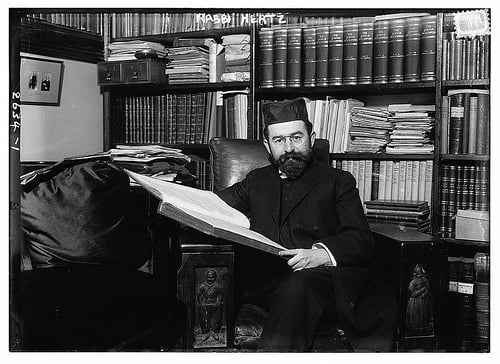
Nor did Oro ever talk of what I had seemed to see in his company, although he continued from time to time to visit me at night. But now our conversation was of other matters. As Bastin had discovered, by some extraordinary gift he had soon learned how to read the English language, although he never spoke a single word in that tongue. Among our reference books that we brought from the yacht, was a thin paper edition of the Encyclopedia Britannica, which he borrowed when he discovered that it contained compressed information about the various countries of the world, also concerning almost every other matter. My belief is that within a month or so that marvelous old man not only read this stupendous work from end to end, but that he remembered everything of interest which it contained. At least, he would appear and show the fullest acquaintance with certain subjects or places, seeking further light from me concerning them, which very often I was quite unable to give him.
An accident, as it chanced, whereof I need not set out the details, caused me to discover that his remarkable knowledge was limited. Thus, at one period, he knew little about any modern topic which began with a letter later in the alphabet than, let us say, C. A few days afterwards he was acquainted with those up to F, or G; and so on till he reached Z, when he appeared to me to know everything, and returned the book. Now, indeed, he was a monument of learning, very ancient and very new, and with some Encyclopedia-garnered facts or deductions of what had happened between.
Moreover, he took to astronomical research, for more than once we saw him standing on the rock at night studying the heavens. On one of these occasions, when he had the two metal plates, of which I have spoken, in his hands, I ventured to approach and ask what he did. He replied that he was checking his calculations that he found to be quite correct, an exact period of two hundred and fifty thousand years having gone by since he laid himself down to sleep. Then, by aid of the plates, he pointed out to me certain alterations that had happened during that period in the positions of some of the stars.
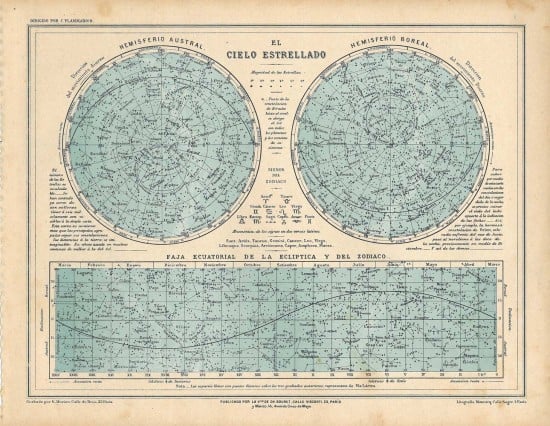
For instance, he showed me one which, by help of my glasses, I recognised as Sirius, and remarked that two hundred and fifty thousand years ago it was further away and much smaller. Now it was precisely in the place and of the size which he had predicted, and he pointed to it on his prophetic map. Again he indicated a star that the night-glass told me was Capella, which, I suppose, is one of the most brilliant stars in the sky, and showed me that on the map he had made two hundred and fifty thousand years ago, it did not exist, as then it was too far north to appear thereon. Still, he observed, the passage of this vast period of time had produced but little effect upon the face of the heavens. To the human eye the majority of the stars had not moved so very far.
“And yet they travel fast, O Humphrey,” he said. “Consider then how great is their journey between the time they gather and that day when, worn-out, once more they melt to vaporous gas. You think me long-lived who compared to them exist but a tiny fraction of a second, nearly all of which I have been doomed to pass in sleep. And, Humphrey, I desire to live —I, who have great plans and would shake the world. But my day draws in; a few brief centuries and I shall be gone, and — whither, whither?”
“If you lived as long as those stars, the end would be the same, Oro.”
“Yes, but the life of the stars is very long, millions of millions of years; also, after death, they reform, as other stars. But shall I reform as another Oro? With all my wisdom, I do not know. It is known to Fate only —Fate-the master of worlds and men and the gods they worship —Fate, whom it may please to spill my gathered knowledge, to be lost in the sands of Time.”
“It seems that you are great,” I said, “and have lived long and learned much. Yet the end of it is that your lot is neither worse nor better than that of us creatures of an hour.”
“It is so, Humphrey. Presently you will die, and within a few centuries I shall die also and be as you are. You believe that you will live again eternally. It may be so because you do believe, since Fate allows Faith to shape the future, if only for a little while. But in me Wisdom has destroyed Faith and therefore I must die. Even if I sleep again for tens of thousands of years, what will it help me, seeing that sleep is unconsciousness and that I shall only wake again to die, since sleep does not restore to us our youth?”
He ceased, and walked up and down the rock with a troubled mien. Then he stood in front of me and said in a triumphant voice:
“At least, while I live I will rule, and then let come what may come. I know that you do not believe, and the first victory of this new day of mine shall be to make you believe. I have great powers and you shall see them at work, and afterwards, if things go right, rule with me for a little while, perhaps, as the first of my subjects. Hearken now; in one small matter my calculations, made so long ago, have gone wrong. They showed me that at this time a day of earthquakes, such as those that again and again have rocked and split the world, would recur. But now it seems that there is an error, a tiny error of eleven hundred years, which must go by before those earthquakes come.”
“Are you sure,” I suggested humbly, “that there is not also an error in those star-maps you hold?”
“I am sure, Humphrey. Some day, who knows? You may return to your world of modern men who, I gather, have knowledge of the great science of astronomy. Take now these maps with which I have done, and submit them to the most learned of those men, and let them tell you whether I was right or wrong in what I wrote upon this metal two hundred and fifty thousand years ago. Whatever else is false, at least the stars in their motions can never die.”
Then he handed me the maps and was gone. I have them today, and if ever this book is published, they will appear with it, that those who are qualified may judge of them and of the truth or otherwise of Oro’s words.
From that night forward for quite a long time I saw Oro no more. Nor indeed did any of us, since for some reason of his own he forbade us to visit the under ground city of Nyo. Oddly enough, however, he commanded Yva to bring down the spaniel, Tommy, to be with him from time to time. When I asked her why, she said it was because he was lonely and desired the dog’s companionship. It seemed to us very strange that this super-man, who had the wisdom of ten Solomons gathered in one within his breast, should yet desire the company of a little dog. What then was the worth of learning and long life, or, indeed, of anything? Well, Solomon himself asked the question ages since, and could give no answer save that all is vanity.
I noted about this time that Yva began to grow very sad and troubled; indeed, looking at her suddenly on two or three occasions, I saw that her beautiful eyes were aswim with tears. Also, I noted that always as she grew sadder she became, in a sense, more human. In the beginning she was, as it were, far away. One could never forget that she was the child of some alien race whose eyes had looked upon the world when, by comparison, humanity was young; at times, indeed, she might have been the denizen of another planet, strayed to earth. Although she never flaunted it, one felt that her simplest word hid secret wisdom; that to her books were open in which we could not read. Moreover, as I have said, occasionally power flamed out of her, power that was beyond our ken and understanding.
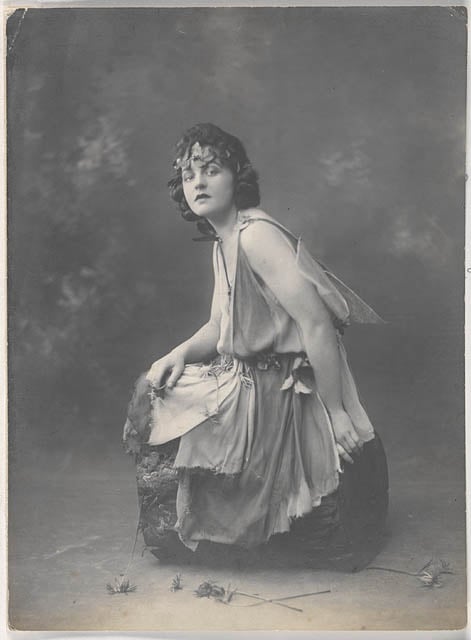
Yet with all this there was nothing elfish about her, nothing uncanny. She was always kind, and, as we could feel, innately good and gentle-hearted, just a woman made half-divine by gifts and experience that others lack. She did not even make use of her wondrous beauty to madden men, as she might well have done had she been so minded. It is true that both Bastin and Bickley fell in love with her, but that was only because all with whom she had to do must love her, and then, when she told them that it might not be, it was in such a fashion that no soreness was left behind. They went on loving her, that was all, but as men love their sisters or their daughters; as we conceive that they may love in that land where there is no marrying or giving in marriage.
But now, in her sadness, she drew ever nearer to us, and especially to myself, more in tune with our age and thought. In truth, save for her royal and glittering loveliness in which there was some quality which proclaimed her of another blood, and for that reserve of hidden power which at times would look out of her eyes or break through her words, she might in most ways have been some singularly gifted and beautiful modern woman.
The time has come when I must speak of my relations with Yva and of their climax. As may have been guessed, from the first I began to love her. While the weeks went on that love grew and grew, until it utterly possessed me, although for a certain reason connected with one dead, at first I fought against it. Yet it did not develop quite in the fashion that might have been expected. There was no blazing up of passion’s fire; rather was there an ever-increasing glow of the holiest affection, till at last it became a lamp by which I must guide my feet through life and death. This love of mine seemed not of earth but from the stars. As yet I had said nothing to her of it because in some way I felt that she did not wish me to do so, felt also that she was well aware of all that passed within my heart, and desired, as it were, to give it time to ripen there. Then one day there came a change, and though no glance or touch of Yva’s told me so, I knew that the bars were taken down and that I might speak.
It was a night of full moon. All that afternoon she had been talking to Bastin apart, I suppose about religion, for I saw that he had some books in his hand from which he was expounding something to her in his slow, earnest way. Then she came and sat with us while we took our evening meal. I remember that mine consisted of some of the Life-water which she had brought with her and fruit, for, as I think I have said, I had acquired her dislike to meat, also that she ate some plantains, throwing the skins for Tommy to fetch and laughing at his play. When it was over, Bastin and Bickley went away together, whether by chance or design I do not know, and she said to me suddenly:
“Humphrey, you have often asked me about the city Pani, of which a little portion of the ruins remains upon this island, the rest being buried beneath the waters. If you wish I will show you where our royal palace was before the barbarians destroyed it with their airships. The moon is very bright, and by it we can see.”
I nodded, for, knowing what she meant, somehow I could not answer her, and we began the ascent of the hill. She explained to me the plan of the palace when we reached the ruins, showing me where her own apartments had been, and the rest. It was very strange to hear her quietly telling of buildings which had stood and of things that had happened over two hundred and fifty thousand years before, much as any modern lady might do of a house that had been destroyed a month ago by an earthquake or a Zeppelin bomb, while she described the details of a disaster which now frightened her no more. I think it was then that for the first time I really began to believe that in fact Yva had lived all those aeons since and been as she still appeared.
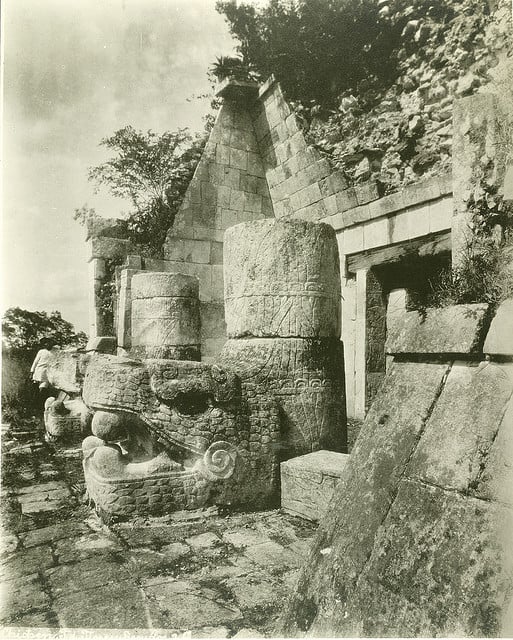
We passed from the palace to the ruins of the temple, through what, as she said, had been a pleasure-garden, pointing out where a certain avenue of rare palms had grown, down which once it was her habit to walk in the cool of the day. Or, rather, there were two terraced temples, one dedicated to Fate like that in the underground city of Nyo, and the other to Love. Of the temple to Fate she told me her father had been the High Priest, and of the temple to Love she was the High Priestess.
Then it was that I understood why she had brought me here.
She led the way to a marble block covered with worn-out carvings and almost buried in the débris. This, she said, was the altar of offerings. I asked her what offerings, and she replied with a smile:
“Only wine, to signify the spirit of life, and flowers to symbolise its fragrance,” and she laid her finger on a cup-like depression, still apparent in the marble, into which the wine was poured.
Indeed, I gathered that there was nothing coarse or bacchanalian about this worship of a prototype of Aphrodite; on the contrary, that it was more or less spiritual and ethereal. We sat down on the altar stone. I wondered a little that she should have done so, but she read my thought, and answered:
“Sometimes we change our faiths, Humphrey, or perhaps they grow. Also, have I not told you that sacrifices were offered on this altar?” and she sighed and smiled.
I do not know which was the sweeter, the smile or the sigh.
We looked at the water glimmering in the crater beneath us on the edge of which we sat. We looked at heaven above in which the great moon sailed royally. Then we looked into each other’s eyes.
“I love you,” I said.
“I know it,” she answered gently. “You have loved me from the first, have you not? Even when I lay asleep in the coffin you began to love me, but until you dreamed a certain dream you would not admit it.”
“Yva, what was the meaning of that dream?”
“I cannot say, Humphrey. But I tell you this. As you will learn in time, one spirit may be clothed in different garments of the flesh.”
I did not understand her, but, in some strange way, her words brought to my mind those that Natalie spoke at the last, and I answered:
“Yva, when my wife lay dying she bade me seek her elsewhere, for certainly I should find her. Doubtless she meant beyond the shores of death — or perhaps she also dreamed.”
She bent her head, looking at me very strangely.
“Your wife, too, may have had the gift of dreams, Humphrey. As you dream and I dream, so mayhap she dreamed. Of dreams, then, let us say no more, since I think that they have served their purpose, and all three of us understand.”
Then I stretched out my arms, and next instant my head lay upon her perfumed breast. She lifted it and kissed me on the lips, saying:
“With this kiss again I give myself to you. But oh! Humphrey, do not ask too much of the god of my people, Fate,” and she looked me in the eyes and sighed.
“What do you mean?” I asked, trembling.
“Many, many things. Among them, that happiness is not for mortals, and remember that though my life began long ago, I am mortal as you are, and that in eternity time makes no difference.”
“And if so, Yva, what then? Do we meet but to part?”
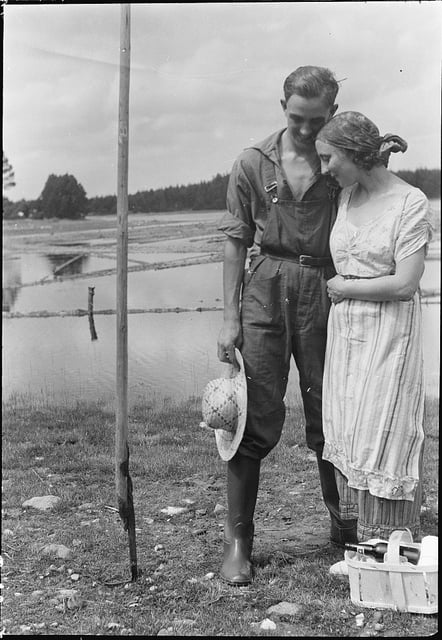
“Who said it? Not I. Humphrey, I tell you this. Nor earth, nor heaven, nor hell have any bars through which love cannot burst its way towards reunion and completeness. Only there must be love, manifested in many shapes and at many times, but ever striving to its end, which is not of the flesh. Aye, love that has lost itself, love scorned, love defeated, love that seems false, love betrayed, love gone astray, love wandering through the worlds, love asleep and living in its sleep, love awake and yet sleeping; all love that has in it the germ of life. It matters not what form love takes. If it be true I tell you that it will win its way, and in the many that it has seemed to worship, still find the one, though perchance not here.”
At her words a numb fear gripped my heart.
“Not here? Then where?” I said.
“Ask your dead wife, Humphrey. Ask the dumb stars. Ask the God you worship, for I cannot answer, save in one word —Somewhere! Man, be not afraid. Do you think that such as you and I can be lost in the aching abysms of space? I know but little, yet I tell you that we are its rulers. I tell you that we, too, are gods, if only we can aspire and believe. For the doubting and timid there is naught. For those who see with the eyes of the soul and stretch out their hands to grasp there is all. Even Bastin will tell you this.”
“But,” I said, “life is short. Those worlds are far away, and you are near.”
She became wonderful, mysterious.
“Near I am far,” she said; “and far I am near, if only this love of yours is strong enough to follow and to clasp. And, Humphrey, it needs strength, for here I am afraid that it will bear little of such fruit as men desire to pluck.”
Again terror took hold of me, and I looked at her, for I did not know what to say or ask.
“Listen,” she went on. “Already my father has offered me to you in marriage, has he not, but at a price which you do not understand? Believe me, it is one that you should never pay, since the rule of the world can be too dearly bought by the slaughter of half the world. And if you would pay it, I cannot.”
“But this is madness!” I exclaimed. “Your father has no powers over our earth.”
“I would that I could think so, Humphrey. I tell you that he has powers and that it is his purpose to use them as he has done before. You, too, he would use, and me.”
“And, if so, Yva, we are lords of ourselves. Let us take each other while we may. Bastin is a priest.”
“Lords of ourselves! Why, for ought I know, at this very moment Oro watches us in his thought and laughs. Only in death, Humphrey, shall we pass beyond his reach and become lords of ourselves.”
“It is monstrous!” I cried. “There is the boat, let us fly away.”
“What boat can bear us out of stretch of the arm of the old god of my people, Fate, whereof Oro is the high priest? Nay, here we must wait our doom.”
“Doom,” I said —”doom? What then is about to happen?”
“A terrible thing, as I think, Humphrey. Or, rather, it will not happen.”
“Why not, if it must?”
“Beloved,” she whispered, “Bastin has expounded to me a new faith whereof the master-word is Sacrifice. The terrible thing will not happen because of sacrifice! Ask me no more.”
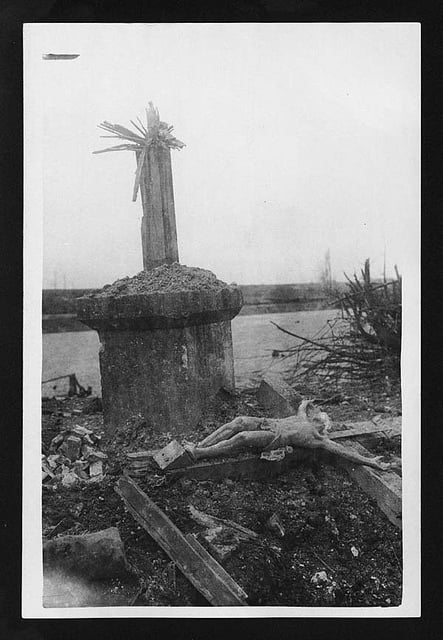
She mused a while, seated there in the moonlight upon the ancient altar of sacrifice, the veil she wore falling about her face and making her mysterious. Then she threw it back, showing her lovely eyes and glittering hair, and laughed.
“We have still an earthly hour,” she said; “therefore let us forget the far, dead past and the eternities to come and be joyful in that hour. Now throw your arms about me and I will tell you strange stories of lost days, and you shall look into my eyes and learn wisdom, and you shall kiss my lips and taste of bliss — you, who were and are and shall be — you, the beloved of Yva from the beginning to the end of Time.”
THE COMMAND
I think that both Bastin and Bickley, by instinct as it were, knew what had passed between Yva and myself and that she had promised herself to me. They showed this by the way in which they avoided any mention of her name. Also they began to talk of their own plans for the future as matters in which I had no part. Thus I heard them discussing the possibility of escape from the island whereof suddenly they seemed to have grown weary, and whether by any means two men (two, not three) could manage to sail and steer the lifeboat that remained upon the wreck. In short, as in all such cases, the woman had come between; also the pressure of a common loss caused them to forget their differences and to draw closer together. I who had succeeded where they both had failed, was, they seemed to think, out of their lives, so much that our ancient intimacy had ended.
This attitude hurt me, perhaps because in many respects the situation was awkward. They had, it is true, taken their failures extremely well, still the fact remained that both of them had fallen in love with the wonderful creature, woman and yet more than woman, who had bound herself to me. How then could we go on living together, I in prospective possession of the object that all had desired, and they without the pale?
Moreover, they were jealous in another and quite a different fashion because they both loved me in their own ways and were convinced that I who had hitherto loved them, henceforward should have no affection left to spare, since surely this Glittering Lady, this marvel of wisdom and physical perfections would take it all. Of course they were in error, since even if I could have been so base and selfish, this was no conduct that Yva would have wished or even suffered. Still that was their thought.
Mastering the situation I reflected a little while and then spoke straight out to them.
“My friends,” I said, “as I see that you have guessed, Yva and I are affianced to each other and love each other perfectly.”
“Yes, Arbuthnot,” said Bastin, “we saw that in your face, and in hers as she bade us good night before she went into the cave, and we congratulate you and wish you every happiness.”
“We wish you every happiness, old fellow,” chimed in Bickley. He paused a while, then added, “But to be honest, I am not sure that I congratulate you.”
“Why not, Bickley?”
“Not for the reason that you may suspect, Arbuthnot, I mean not because you have won where we have lost, as it was only to be expected that you would do, but on account of something totally different. I told you a while ago and repetition is useless and painful. I need only add therefore that since then my conviction has strengthened and I am sure, sorry as I am to say it, that in this matter you must prepare for disappointment and calamity. That woman, if woman she really is, will never be the wife of mortal man. Now be angry with me if you like, or laugh as you have the right to do, seeing that like Bastin and yourself, I also asked her to marry me, but something makes me speak what I believe to be the truth.”
“Like Cassandra,” I suggested.
“Yes, like Cassandra who was not a popular person.”
At first I was inclined to resent Bickley’s words — who would not have been in the circumstances? Then of a sudden there rushed in upon my mind the conviction that he spoke the truth. In this world Yva was not for me or any man. Moreover she knew it, the knowledge peeped out of every word she spoke in our passionate love scene by the lake. She was aware, and subconsciously I was aware, that we were plighting our troth, not for time but for eternity. With time we had little left to do; not for long would she wear the ring I gave her on that holy night.
NEXT WEEK: “‘Then, Oro, if you could do what you threaten, you would drown hundreds of millions of people.’ ‘If I could do! If I could do!’ he exclaimed, glaring at Bickley. ‘Well, tomorrow you shall see what I can do. Oh! why do I grow angry with this fool? For the rest, yes, they must drown. What does it matter? Their end will be swift; some few minutes of terror, that is all, and in one short century every one of them would have been dead.'”
RADIUM AGE SCIENCE FICTION: “Radium Age” is HILOBROW’s name for the 1904–33 era, which saw the discovery of radioactivity, the revelation that matter itself is constantly in movement — a fitting metaphor for the first decades of the 20th century, during which old scientific, religious, political, and social certainties were shattered. This era also saw the publication of genre-shattering writing by Edgar Rice Burroughs, Sax Rohmer, E.E. “Doc” Smith, Jack London, Arthur Conan Doyle, Aldous Huxley, Olaf Stapledon, Karel Čapek, H.P. Lovecraft, Charlotte Perkins Gilman, Yevgeny Zamyatin, Philip Gordon Wylie, and other pioneers of post-Verne/Wells, pre-Golden Age “science fiction.” More info here.
HILOBOOKS: The mission of HiLoBooks is to serialize novels on HiLobrow; and also, as of 2012, operating as an imprint of Richard Nash’s Cursor, to reissue Radium Age science fiction in beautiful new print editions. So far, we have published Jack London’s The Scarlet Plague, Rudyard Kipling’s With the Night Mail (and “As Easy as A.B.C.”), Arthur Conan Doyle’s The Poison Belt, H. Rider Haggard’s When the World Shook, Edward Shanks’s The People of the Ruins, William Hope Hodgson’s The Night Land, and J.D. Beresford’s Goslings. Forthcoming: E.V. Odle’s The Clockwork Man, Cicely Hamilton’s Theodore Savage, and Muriel Jaeger’s The Man with Six Senses. For more information, visit the HiLoBooks homepage.
READ: You are reading H. Rider Haggard’s When The World Shook. Also read our serialization of: Jack London’s The Scarlet Plague | Rudyard Kipling’s With the Night Mail and “As Easy As A.B.C.” | Arthur Conan Doyle’s The Poison Belt
ORIGINAL FICTION: HILOBROW has serialized three novels: James Parker’s The Ballad of Cocky The Fox (“a proof-of-concept that serialization can work on the Internet” — The Atlantic) and Karinne Keithley Syers’s Linda Linda Linda. We also publish original stories and comics.
